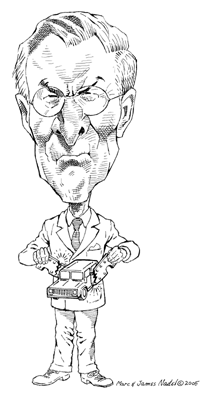The Scouring of the Bush Presidency
It’s wonderful to be right. Not all the time, not even most of the time, but some of the time. And that part of the time when you do happen to be right, it’s even better to be surprisingly and undeniably right.

For instance, in the run-up to the last midterm election, Democrats finally managed to unify around a single, nationalized talking point: that one-party rule had created a culture of corruption in Washington, a culture intent on undermining key democratic institutions as a way of maintaining permanent majority status.
Give us control of even one chamber, Democrats argued, and we will use our restored subpoena power to show you the rot in the foundations of government. Give us control of two, and we’ll sweep it away.
It was classic reformist language, but I believed it, deeply believed it. So did every Democrat I know.
But in spite of all that meticulous mental preparation and those deep reserves of political faith, the actual effect of Democratic oversight on the Bush Administration — just in the last few weeks — has been breath-taking.
It isn’t necessarily that more scandals are suddenly coming to light; nearly every three-month period for the last four or five years has produced evidence of a handful of separate abuses.
What has been fundamentally changed are the physics governing the scandals themselves.
 I remember watching Donald Rumsfeld testify before Congress during the Abu Ghraib scandal. Outrage over the abuses had reached its height, both nationally and domestically; reporters had conclusively linked the abuses in Iraq to those at Guantanamo Bay, indicating a policy of torture and humiliation fashioned at the highest levels.
I remember watching Donald Rumsfeld testify before Congress during the Abu Ghraib scandal. Outrage over the abuses had reached its height, both nationally and domestically; reporters had conclusively linked the abuses in Iraq to those at Guantanamo Bay, indicating a policy of torture and humiliation fashioned at the highest levels.
And in his own maddeningly blasé fashion, Rumsfeld began by taking full responsibility for the whole sadomasochistic shooting match.
Of course, the rest of Rumsfeld’s testimony was dedicated to unwriting each clause of that opening paragraph, in order, one by one.
It was a shocking display of political hubris, and I was certain that Rumsfeld would regret it, and soon: Bush was six months out from the second-most important election of his political life.
But I was wrong. Bush, Cheney, Rumsfeld, Delay and Hastert held tight on Abu Ghraib, and the moment passed.
Those men — the President, the Vice President, the Secretary of Defense and the Republican Congressional leadership — functioned for years like the five fat fingers of a single unwashed hand. No matter what came to light, no matter who or what it threatened, they would fold together, blindly, into a fist.
The more damning the revelations, the tighter that fist.
Of course, that was then.
 Now a different dynamic has taken hold, and it goes something like this: 1) allegations come to light, 2) Bush administration officials admit some small “issues” or “errors,” but claim there is no overriding issue of any concern, 3) Congressional committee chairmen contact those involved about testifying under oath.
Now a different dynamic has taken hold, and it goes something like this: 1) allegations come to light, 2) Bush administration officials admit some small “issues” or “errors,” but claim there is no overriding issue of any concern, 3) Congressional committee chairmen contact those involved about testifying under oath.
And of course 4) suddenly all manner of holy hell breaks loose, with the Administration desperate to fire or force the resignations of all key players before they can be sworn in on the Hill.
The Walter Reed scandal set the pattern. Within days of the Washington Post expose — and under subpoena threat by Congress — a Major General, the Army Secretary, and the Army Surgeon General had all been summarily ousted.
For the Bush Administration, it was unprecedented scandal management; under Rumsfeld and the outgoing GOP Congressional leadership, some lower level types would have been scapegoated, and the White House would have brazened out the scandal.
And indeed, the Secretary of the Army Francis Harvey tried initially to take control of the situation by pre-emptively assigning guilt: “We had some NCO’s (non-commissioned officers) who weren’t doing their jobs, period.”
That “period” with which Harvey rounded off his sentence couldn’t be any more telling.
It would be possible to argue that the Walter Reed scandal scattered Administration defenses so completely only because it went to the core of the Republican “Support the Troops” mantra.
But the story of the United States Attorney purge — the so-called Gonzales Eight — has worked in almost precisely the same fashion. After initially arguing that the mass-firing was merely “an overblown personnel matter,” the Administration suddenly caved, agreeing to rescind the enabling element of the Patriot Act, and to allow Justice Department officials to provide testimony without a subpoena.
 And the documents released in the last few days by the White House make clear why resistance was not an option: email ties Karl Rove, Harriet Myers, and Bush himself to the firings in a straight line going back more than a year to the earliest planning stages.
And the documents released in the last few days by the White House make clear why resistance was not an option: email ties Karl Rove, Harriet Myers, and Bush himself to the firings in a straight line going back more than a year to the earliest planning stages.
Chief of Staff to the Attorney General, Kyle Sampson, has already packed his bags.
And if the last several weeks are any guide, the current stand-off — the White House suggesting that Rove and others will not testify, and Pat Leahy suggesting that they damn well better — will be revealed to be an Administration bluff by week’s end.
This new scandal dynamic reminded me of something, but for the longest time I couldn’t pin down the resemblance. And then late last night, I got out of bed and hunted up my old battered copy of Tolkien’s The Return of the King.
And there it was, in the second to the last chapter, “The Scouring of the Shire.” The Wizard Saruman has reached the Shire long before the hobbits of the Fellowship, and he’s maliciously fouled the water, cut down the trees, tortured and beaten down all who would resist.
And although he is a shadow of his former self, Saruman warns the hobbits that if they strike him, his blood will stain the Shire, cursing it forever. Of course, it turns out to be Saruman’s own mistreated henchman who kills him, but still the hobbits watch in horror as a dark spirit seems to gather over the body.
And then a clean wind breaks it up, and blows it entirely away.
[This piece ran first in the Vermont Guardian.]